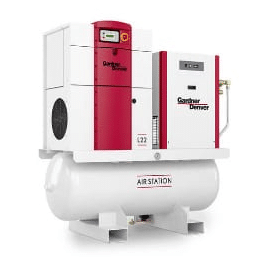Considering winter maintenance for your air compressor unit? As you move forward with any winterization strategy, it is important to understand not only your particular unit’s functionality but also the general impacts of cold weather on compressor systems and how to prevent and remedy these impacts.
1 .How cold is too cold for an air compressor?
A guideline to start with is understanding that optimal performance in an air compressor happens at a temperature threshold of around 41 degrees Fahrenheit. Operating at lower temperatures can produce freezing condensate inside of a compressor that can slow or stop the unit following icy clogs or damage to the mechanics or components. With this in mind, if you don’t have a strategy in this area, this is a good place to begin.
2. How do I keep my air compressor tank from freezing?
A preventative strategy is best to head off any damage to any stoppage in your unit due to a frozen air compressor. There are a few simple ways to protect your compressor from weather elements, including:
- Utilize a space heating device or improved insulation in the area of your air compressor unit
- Ensure your oil levels are adequate as air compressors work harder to function during winter months and low oil levels can cause wear and tear within your unit that can lead to damage
- Drain condensate regularly to prevent condensate buildup that can freeze in winter months and cause mechanical interruptions in your unit
Additionally, completing a seasonal, maintenance checklist for your compressor unit is vital, particularly if you have never done any winter maintenance. For example, it’s critical to ensure your compressed air dryers and condensate drains are functioning and don’t need to be replaced. Cullum & Brown can customize a winter maintenance plan to fit your commercial air compressor needs.
An analysis of your air compressor unit can also tell you where you might need to perform any seasonal maintenance. Cullum & Brown will evaluate your compressor system based on compressed air best practices to help you develop a comprehensive winterization strategy.
3. How do I address damage due to a frozen air compressor?
If you suspect damage due to freezing in your compressor equipment, it’s important to check your entire system to diagnose the specific problem spot or spots. Common issues can include frozen condensate blocking pipes, or valves frozen open or closed, or expanding frozen condensate causing a valve to crack or split.
Raising the temperature in the immediate area of the problem can sometimes help, however, if this doesn’t work or there’s a bigger problem or you are unable to diagnose the problem, it’s time to reach out to a professional for help. Cullum & Brown offers 24/7 emergency maintenance service to address any damage or stoppages due to freezing in your air compressor.
4. How do I know when to replace an air compressor?
Whether winter weather has gotten the best of your air compressor equipment or your system is simply old and no longer functional, it might be time to replace your unit. Other issues that can require replacement include compressor performance consistently down, or the compressor system continually shutting off, which could mean a failure of components that can’t be repaired.
To schedule your air compressor system analysis, contact Cullum & Brown at 816-842-7711 in Kansas City or 417-869-0066 in Springfield.

